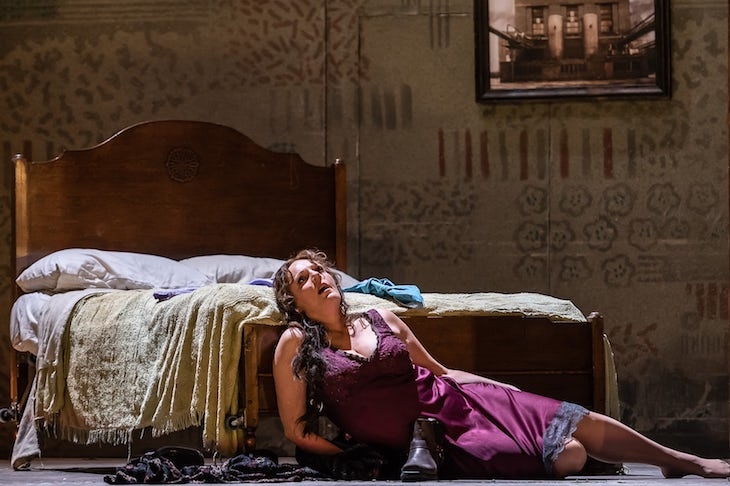There is famously no door into the late-night diner of Edward Hopper’s ‘Nighthawks’. Its three silent patrons are trapped behind the plate-glass window — specimens of urban disaffection and isolation. In Richard Jones’s Lady Macbeth of Mtsensk it’s the windows that are so disquietingly absent.
John Macfarlane’s designs propel the action of Shostakovich’s final opera through an endless enfilade of rooms. There are doors aplenty, and thresholds — of morality, sexuality and social status — are gleefully broached and breached, but each ultimately leads only to another domestic hell. If Hopper’s characters are goldfish in a glass bowl, then Jones’s are rats in a cage, and with the rat poison in view from the start the scene is rank with foreboding.
There’s a delicious squalor but also — more surprisingly — a disarming pathos to Jones’s production, seen here at the Royal Opera for the first time since 2004. Updating the action of Shostakovich’s Soviet-censored opera from pre-revolutionary Russia to the 1950s, Jones steers away from any overt politicking in favour of kitchen-sink intimacy — a claustrophobic operatic close-up that refuses to pan to the wide shot, crushing a chorus of workers and even a brass band into the close confines of the domestic space.
The apartment (papered in signature Jones prints, natch) that Katerina Ismailova shares with her lecherous father-in-law Boris and her husband Zinovy may be grubby and bleak, but a baby-pink fridge and mint-green kitchen units speak pathetically of aspiration — of a fantasy of bourgeois domesticity long-since tarnished by life. It’s these gestures of hope — Katerina’s green stockings, defiantly bright even as she heads to the Siberian prison camp, the wallpaper she hangs as a backdrop to her new life with lover Sergei — that stab deepest in a production that isn’t short on violence.
Last seen over a decade ago, this Lady Macbeth may have returned with many of the same cast, meticulously revived by Elaine Kidd, but after the watershed of #MeToo its perspective seems altered. If there was previously a Tarantino-esque gloss and glibness to the production’s unusual black humour — the severed heads, brandished axes and exuberant gang rape — there now seems to be a more ragged urgency, a makeshift quality to action that turns domestic abuse into three murders. It’s not the slick shock and awe of Kill Bill (off whose shiny surface all emotion slides cleanly) but the grimy, pitted banality of Martin McDonagh that we now see here.
Shostakovich’s score is a cornered animal that lashes out in furious volleys of brass and snarling woodwind. The sheer power of the thing — instruments spilling out into the boxes either side of the stage — overwhelms.But where some fight their way out with brute force, Antonio Pappano’s account goes for sly cunning and sardonic wit — that detumescent trombone glissando at the height of Katerina and Sergei’s passion has rarely sounded more knowing.
Calculated exaggeration in the orchestra meets quieter truths in the cast, generating the friction that ignites this ‘tragi-satirical’ opera. Eva-Maria Westbroek’s Katerina is bravely unbeautiful — singing us the scars of this damaged woman — while American tenor Brandon Jovanovich’s Sergei licks them open again with the probing ardour of his delivery. John Daszak’s Zinovy and John Tomlinson’s Boris (the latter tending just a little cartoonish) add their textures to this delicious operatic ragout of horror. Revenge may be a dish best served cold, but even after 12 years Richard Jones’s Lady Macbeth shows no sign of cooling down.
Musical temperatures were also raised at St George’s Hanover Square this week as the London Handel Festival approached its end with performances of Handel’s Teseo by period ensemble La Nuova Musica and student soloists from the Royal Academy of Music. It takes a certain chutzpah to tackle a piece designed with the thrill-seeking London audience in mind — a magic opera whose absurd plot, rich in visual spectacle, was chosen to show off the ‘machinery’ of the theatre — in a concert performance in a church with some of the worst sightlines (and most uncomfortable pews) in the city, without even the assistance of surtitles.
Compensating for this dramatic lack with their musical atmospherics, David Bates and his players served up an overheated account of this delightful (if lightweight) score. Tempos surged and swayed to slightly nauseous effect, and a fine young cast were audibly unsettled by the bullying force of the band. There were a sequence of lovely oboe solos from Leo Duarte, a measured, authoritative Egeo from Frances Gregory and fizzing thrills from Ilona Revolskaya’s Agilea and Alexandra Oomens’s minxy Clizia, but what started off in the overture as unfettered musical joy and release transformed by the end into a manic instability. Teseo is no Giulio Cesare, but this divertissement has an innocent appeal that we never quite heard here among all the histrionics.






Comments